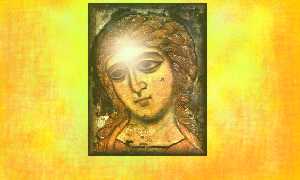
 |
 |
HILDEGARD OF BINGEN (1098-1179) Hildegard of Bingen was born into an aristocratic German family. As a child she had visions that were deemed mystical and prophetic. She entered a religious order of holy women in 1106 at the age of eight. She became abbess of the monastery of Diessenberg twenty years later. In the 1140s she moved her convent to Rupertsberg, near Bingen. After a committee authenticated her visions, she continued her visionary life, dictating her revelations to her brother. Her book "Scivias" contains twenty-six visions. ... Hildegard abhorred the body, which she held to be a vehicle for fornication, and considered pleasures of the flesh to be fiendish inventions of the devil. Her way was resurrection in the light of God's gaze. Although she was not formally canonized, her followers proclaimed her a saint. -- Voices of Light: Spiritual and Visionary Poems by Women Around the World from Ancient Sumeria to Now, ed. by Aliki Barnstone (Shambala, 1999). |
|
Sybil
of Rhine Bright searing pressure lays itself deep upon my vision and the articulation of these thoughts. God that I call rich beyond all being discerns his voice upon me as if to call me to the deep labor of voicing his visions. The articulation is painful as I feel my own consciousness separating and the voice of the divine father permeating. Painful, although such a vision I would hope to be on the contrary—an invasion should create a schism of self and a joyous joining with the almighty presence. Perhaps the pain that ensues is not just from a deviation of self but from the fear that overwhelms me—the fear that others may question the divine nature of these visions. God has touched me since the beginning, his voice I heard clearly at so early an age I could barely speak and my body has suffered this—I see it as a kind of trading: one part weaker for another part stronger. And life has positioned me at the disposal of the church by means of my parent’s will. My life is to serve him in the ways he discerns to me in our encounters. I lie here bedridden as I have been for many days. I fear and also know to be true that it is God’s punishment for my negligence in delivering the messages that he has sent to me. God has called me, and although I heard his words I have not taken the path, which he has laid out to be my body’s burden and my soul’s exaltation. Sometimes when the visions descend upon me, the schism becomes as deep as the longest chasm in rock beds imaginable. The chasm so long and dark surrounds my sight and I can no longer see the grace of the Lord’s creations on Earth. I am left in a world of quickening thought that is not my own but the Lord’s. But he takes me not into darkness—though I cannot see—he carries me through the blinding lights that burn in front of me and fills me with understanding and acceptance of the church, the earth, and the nature of all things he has created. The blinding light that fills me in these moments has lent me understanding of the books. The doctrines that I so wished I had studied at a young age were not afforded to me in my childhood, but God has given me their knowledge; and although I did not amass readily—I will now. But it must be in sanction with the church. I fear the scourge of people’s judgment and will not make public my knowledge until approval is obtained. It is vital to my survival as abottess and also in the delivery of my insights.
|
 |
Back to Essay Index |